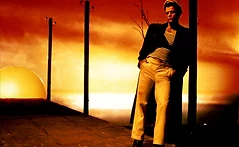
Eric Kearney, long-time manager of the Civic Theatre for Amalgamated Theatres, then Hoyts, and the man behind the Information Desk until 2016, revisits changing fashions in film appreciation.
"Thinking of the Film Festival I realise how it has reflected change in society.
The immigrants who helped populate New Zealand had their own culture and language. The Civic, built in 1929, had a small continental theatre below street level primarily for (Central European) immigrants and films screened in their own languages.
1929 saw sound hit New Zealand screens. Films prior to that had interchanges of script. With the onslaught of sound there was no need to read. If a film had subtitles it was anathema. It was foreign. This fear of reading extended to credits, which eventually took up to five minutes of screen time. The last image on screen led to a lemming-like exit of patrons so that the written word did not defile them. Hence a film with subtitles was ‘art’. It was different. It became a cult and was so different in style compared to the American studio output.
For the Festival, health foods were to replace potato chips and decadent chocolate on the candy bar so that Festival patrons were not seduced into a retrogressive state. If it didn’t have subtitles it wasn’t legitimate cinema. Films were to be screened unmasked with no artifice of magnification (El Toro). Some mothers were disillusioned but interested enough to sit through a screening of Giselle, only to realise it was not the Coralli/Perrot Ballet but the story of a young south American girl who is seduced at a young age and by the last reel is emulating the activities of Pasiphaë.
A film could be screened minus its last reel and the audience would reverentially intone about the brilliance and mysticism of the director. (Ingmar Bergman’s The Serpent’s Egg). The emperor’s new clothes were fashionable and effulgent.
The frisson of In the Realm of the Senses and Gerard Depardieu’s self-mutilation with electric bread knife (Marco Ferrari’s The Last Woman) gave an aura of forbidden, slightly overripe fruit, and could have been the cause of a couple indulging in the beast with two backs gymnastics activities in the ladies toilet. Even a Festival director [not me! — BG] couldn’t resist seduction in a curtained ticket box by a staff member, no doubt debauched by the on-screen images.
Then of course there was the RFF censor’s certificate: films which could be only screened during a film festival. Not suitable for the sensitivities of the hoi polloi. There was an aged Parnell matron who stormed into the foyer to complain about the preceding short film, (Stewart Main’s Twilight of the Gods – definitely not Wagner’s) and Marton Csokas’ full frontal exposure. The matriarch recovered her composure sufficiently to sit through the excesses of Le Reine Margot and Daniel Auteuil’s full frontals!
The two weeks per annum grew into a holy grail. Annual holidays would be taken to coincide with these screenings and the Film Festival grew from a small acorn into a giant oak that embraced the 2000-seat Civic (and sent out roots in 1988 to include the Wintergarden and eventually the St James, Regent and, in the 21st century, six Auckland cinemas).
Sensationalism had to be provided to ensure a good box office. The Society of Community Standards were vocal in protestations and I well recall the vituperation suffered by Michael McLernon (the film’s producer, an expat Kiwi) during the Q+A after Fassbinder’s Querelle, and the vociferous, jingoist walkout of some patrons during Ken Loach’s The Wind That Shakes the Barley. Anticipated films such as winners of Academy Awards were held over for screening at the Film Festival before release to the general public. Television had not arrived and it was a cinema-hungry audience.
The advent of TV, cinema complexes in the suburbs and shopping malls, the world wide web and easier world travel led to many of what would’ve been arthouse films being (initially and tentatively) screened in all cinemas. No longer did the inhabitants of darkened auditoria have to wait until winter too satiate their senses. Espresso coffee and wine became available with a Ploughman’s Lunch and an array of French pastries. Even – quelle horreur – popcorn was permitted to perfume the auditorium.
The wheel has gone full circle and like a religion stripped of its mysticism the Film Festival is another delight from the cornucopia of entertainment that embraces everyone, providing films from around the world not able to compete with the plethora of inanities provided for general consumption."
Image: Querelle